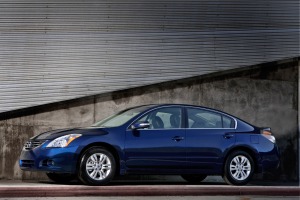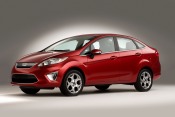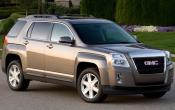
As the number and type of hybrid cars grow, consumer interest in these vehicles increases as well. What initially appealed to a select group of environmentalists is now being bought and considered by more mainstream buyers.
But let's face it: The sticker price of a hybrid vehicle is significantly higher than its gasoline-powered counterpart. Does the improved fuel economy offset the extra cost? What happens if the hybrid drivetrain breaks?
We looked at a variety of issues and talked with hybrid owners and manufacturers to learn the real costs of owning one of these high-tech cars.
Price Premium vs. Incentives
Not counting the Lexus models, hybrid cars cost roughly $1,700 to $11,200 more than comparably equipped gasoline vehicles. However, buyers can offset that premium with a federal tax credit, part of the Energy Policy Act of 2005. The tax credit provides a dollar-for-dollar reduction in the tax bill and go as high as $3,000, depending on the model.
The hitch? Once a manufacturer sells 60,000 vehicles, the credit gradually decreases over a period of 15 months until it is phased out entirely. While the act keeps the tax credit in effect until 2010, Toyota has already reached its cap, and credit for Toyota and Lexus vehicles has been phased out. As of January 1, 2009, credits will no longer be available for Honda. (More details on hybrid tax credits are explained here.)
Making the deal even sweeter, several states offer tax deductions and incentives for hybrid purchases. The rebates vary from state to state, but when combined with the available federal tax credits, they can add up to substantial savings.
Some states also allow a hybrid owner to drive in the carpool lane, while others give discounts or free parking. A list of available federal incentives is available at Edmunds.com hybrid car tax credits page, as well as state and private hybrid incentives available at Hybrid Center.
Insurance Changes
Preliminary research by insurance companies indicates that drivers of hybrid vehicles have a lower risk of being involved in an accident than drivers of non-hybrid vehicles. As a result, Farmers Insurance currently offers a 5 percent discount to hybrid vehicle owners depending on their state, while Travelers Insurance offers a 10 percent discount to hybrid owners nationwide. But there are cases in which insurers will charge a higher premium for a hybrid, so it's important to ask your agent. If you insurer does charge more, you may want to shop around for one that doesn't.
Repairs — No Worries
Hybrid critics warn of potentially expensive repairs associated with the hybrid-specific parts, such as battery packs. "I was a little concerned initially," said Lydia Segal of Alexandria, Virginia, who owns a Lexus RX 400h , "but Toyota's had its hybrid technology out for quite a while now. Plus, I did a lot of research on the Internet and couldn't find anyone who had a problem with the hybrid system."
And there doesn't seem much reason to worry. All the hybrid-specific components in every hybrid vehicle currently on the market are covered under warranty for eight years/100,000 miles or 10 years/150,000 miles, depending on the state, but these components have been shown to have a much longer lifespan in testing. Toyota, for example, reports that its battery packs have lasted for more than 180,000 miles in testing. Every hybrid manufacturer reports that it has conducted testing of hybrid components in extreme temperatures and with repeated charge/discharge cycles with no ill effects on the hybrid system.
Regular Maintenance — a Draw
Most hybrid cars do not require any additional regular maintenance on the hybrid-specific components. An exception is the air filter on the battery system of the Ford Escape Hybrid , which needs to be replaced every 40,000 miles.
The gasoline engine in a hybrid vehicle requires the same maintenance that it would if it were the only power source driving the vehicle. That means oil changes every 5,000-10,000 miles depending on the vehicle and the driving conditions.
In ordinary vehicles the brake pads need to be changed regularly. But the hybrids' regenerative braking systems and their reduced heat means their brake pads typically last much longer. "We've seen customers go 85,000 miles before they needed to replace their brakes on their Prius vehicles," says Toyota's Smith.
Fuel Economy — Hybrid's Strength
Until the EPA changed its methods for calculating fuel economy for 2008 model-year vehicles, there had been a large discrepancy between the EPA fuel economy ratings listed on the window sticker and the "real-world" results most drivers experience. While all vehicles are affected by this discrepancy, hybrid vehicles appear to be more affected by it because their EPA estimates start off higher. "For example," explains Robert Bienenfield, product planning manager at American Honda, "a vehicle that has a fuel economy rating of 20 mpg may only get 18 mpg, while a vehicle that is rated at 50 mpg may only get 45 mpg. This seems like a bigger issue for the more fuel-efficient vehicle, but in reality both vehicles are off by 10 percent."
The EPA's new methods have brought fuel economy ratings more closely in line with real-world driving. For example, the 2007 Toyota Camry Hybrid had EPA-estimated fuel economy of 40 city/38 highway. For 2008, those numbers were revised to 33 city/34 highway. But the new EPA's fuel economy ratings still can't show how widely numbers can vary based on an individual's typical driving route.
"Short trips are the harshest on fuel economy, so anyone who drives just a few miles in his typical trip will see lower mpg numbers than someone who drives, say, 15 miles to work," says Bienenfield. And no matter which car you buy, a "lead foot" will always cost more in gas than a light touch on the accelerator.
Nonetheless, driving a hybrid will always save money over its gas-fueled counterpart. The difference is more significant for some models than others, so look at the 2008 EPA ratings carefully when comparing.
Costs Vs. Benefits
On the surface, it appears that the added costs of purchasing a hybrid are offset by federal and state tax benefits, reduced fuel costs and (potentially) lower insurance rates. Thus far, maintenance and repair costs for hybrid cars seem to be a wash. Of course, much depends on the vehicle you choose, where you live, your insurer and your driving habits.
There are plenty of other reasons to buy a hybrid, including reduced emissions for the environment and a long list of perks, both financial and otherwise. But for the hybrid car owners we spoke with, any additional up-front costs were outweighed by their love for their cars. Linda Sutherland, of Hermosa Beach, California, says her Toyota Highlander Hybrid was the right choice for her family because it can carry plenty of passengers and cargo to their mountain cabin — without being a gas guzzler on her 150-mile daily commute.
Now that she's owned the vehicle for a couple of years, she expects hybrid vehicles are in her family for good. "When we get ready to buy our next vehicle, we'll look for a hybrid convertible. Hopefully one will be available by then," she says.
For more on what motivates everyday consumers to become hybrid car owners, see "Why We Buy Hybrids".









